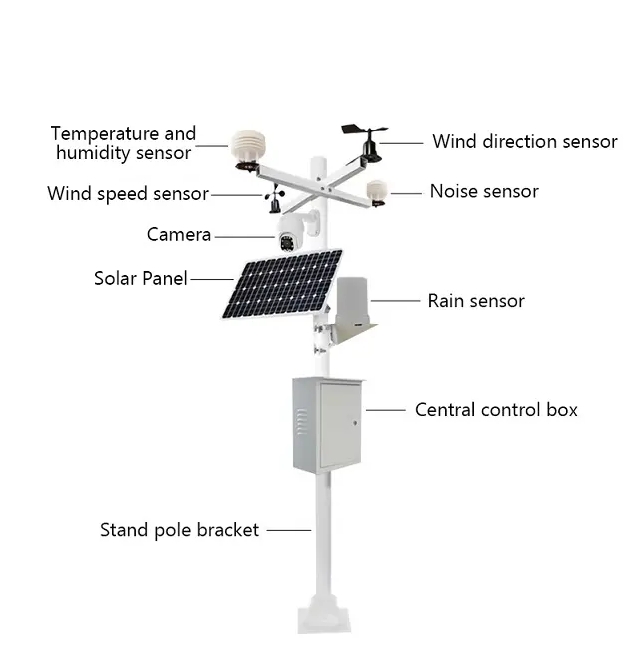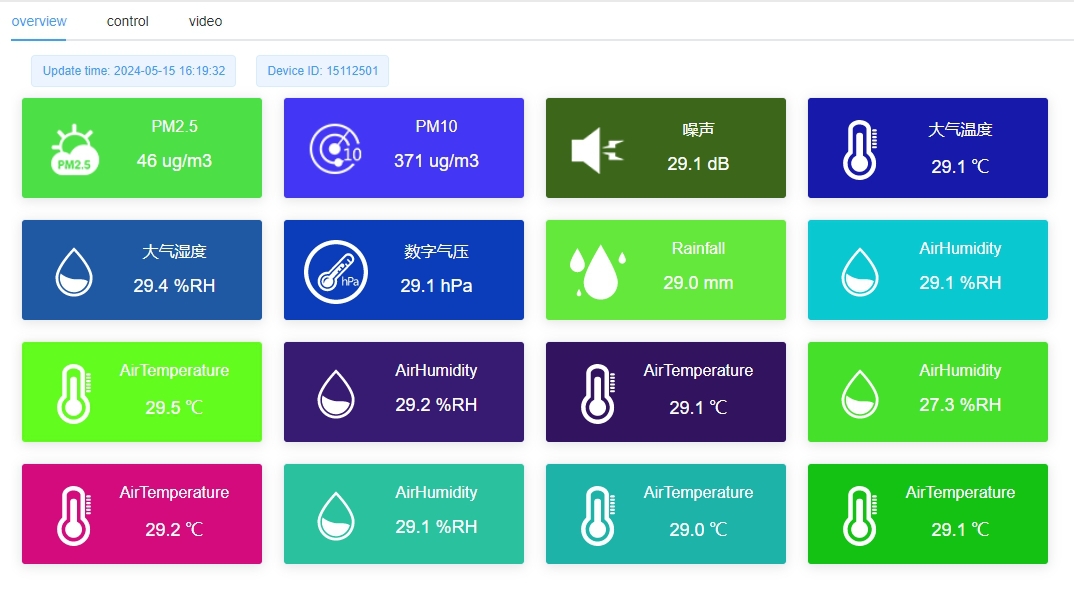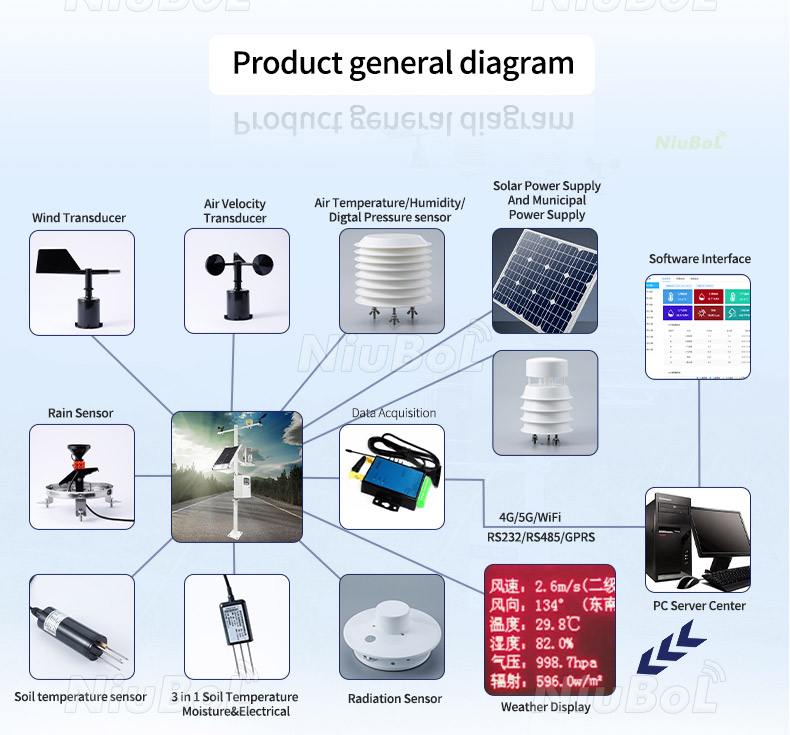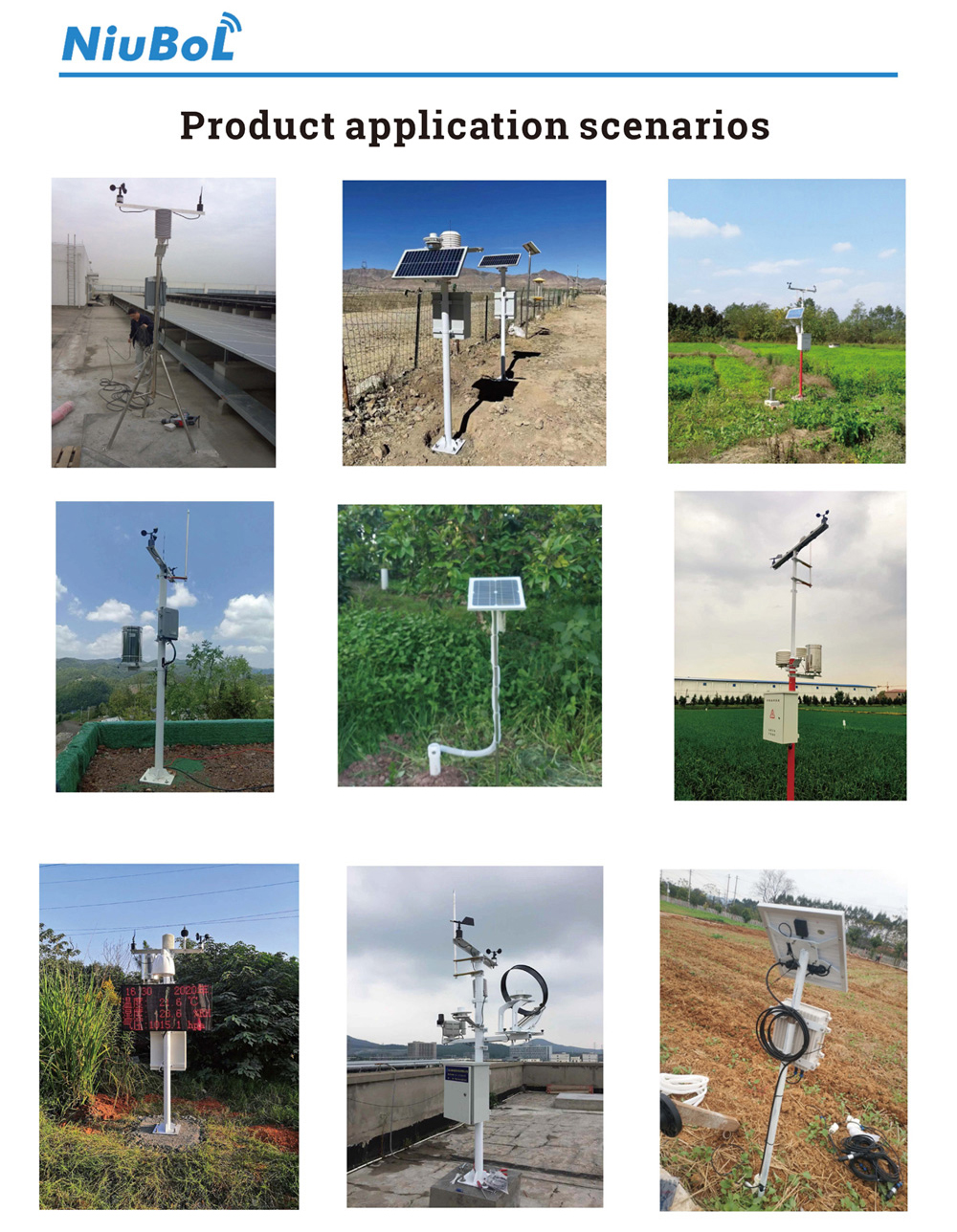

— Products —
 Consumer hotline +8618073152920
Consumer hotline +8618073152920 WhatsApp:+8615367865107
Address:Room 102, District D, Houhu Industrial Park, Yuelu District, Changsha City, Hunan Province, China
All products
Cellular weather stations, as an advanced weather monitoring device, utilize cellular networks (e.g., 4G, 5G, etc.) for data transmission, and these weather stations are equipped with a full set of commercially available sensors to measure wind speed and direction, barometric pressure, relative humidity, temperature, and rainfall. They are particularly useful where WiFi signals are unavailable or too weak, and feature multiple functions such as real-time monitoring, remote tr···
Tel/WhatsApp:+8615367865107
Email:Arvin@niubol.com +Nearly 100 partner companies in more than 68 countries. We are committed to providing high-quality, practical products to meet your needs and help you solve problems. Our products comply with international standards and are certified with ISO, CE and RoHS.Product Details
Cellular weather stations, i.e. wireless weather stations for cellular networks, are a type of weather monitoring equipment that utilizes cellular network technology for data transmission. They are capable of monitoring and recording various meteorological parameters such as temperature, humidity, air pressure, wind speed, wind direction and precipitation in real time by integrating a variety of high-precision sensors and data processing units. The following is a detailed introduction to Cellular weather station:
Cellular weather stations utilize cellular networks (e.g. 4G, 5G, etc.) for data transmission, sending the weather data collected by sensors in real time to a cloud server or a user-specified receiver. This transmission method is characterized by wide coverage, fast transmission speed and high stability, which can ensure the timeliness and accuracy of weather data.
Cellular weather stations are designed for remote weather monitoring and data logging, especially in areas where Wi-Fi or electricity is unavailable or too weak. These stations use cellular networks to transmit weather data, making them ideal for a variety of applications.

1. Sensor module: It includes temperature sensor, humidity sensor, barometric pressure sensor, wind speed sensor, wind direction sensor, etc., which is used to sense various meteorological parameters of the surrounding environment in real time.
2. Data processing unit: responsible for processing and analyzing the data collected by the sensors, converting the raw data into a format that can be displayed and transmitted, and removing noise and errors.
3. Communication module: built-in cellular network communication module, supporting 4G, 5G and other wireless communication methods to realize remote transmission of meteorological data.
4. Power supply system: solar power or battery power supply is usually adopted to ensure that the weather station can run stably for a long time without external power supply.
1. Real-time monitoring: It can monitor and record a variety of meteorological parameters in real time, providing users with comprehensive weather information.
2. Data transmission: Transmits data via cellular network, allowing real-time monitoring and access to weather data from anywhere on the Internet. This is particularly beneficial for monitoring remote areas.
3. Remote Monitoring: Users can remotely monitor the working status and real-time data of the weather station through cell phones, computers and other terminal devices.
4. Data analysis: It supports in-depth analysis and mining of weather data, providing data support for scientific research, agricultural production, weather forecasting and other fields.

5. Portability: Compared with traditional weather stations, Cellular weather stations are more compact and lightweight, easy to carry and install.
6. Reliability and Low Maintenance:Cellular weather stations are built to be reliable and require minimal maintenance, ensuring that they can operate effectively in a variety of environments without the need for frequent maintenance.
7. All-in-one solution:They are pre-assembled and include a cellular plan for online monitoring, making setup straightforward. They typically start with basic monitoring functions such as wind speed, rainfall, temperature, humidity and pressure, but additional sensors can be added to expand functionality.
8. Solar Powered Options:Some models, are solar powered, which is beneficial in remote areas where traditional power sources are not available. This feature also reduces the need to replace and maintain batteries.
9. Ease of Installation and Durability:These weather stations are designed to be easy to install and can withstand harsh weather conditions, ensuring that they remain functional even in challenging environments.
10. Affordability and Efficiency:By simplifying installation and reducing maintenance requirements, cellular weather stations provide an efficient and affordable solution for remote weather monitoring.
11. Comparison with other models: When comparing cellular weather stations with Wi-Fi models, the former has the advantage of being able to operate in areas without an Internet connection, while the latter may be better suited for areas with stable Wi-Fi signals.

Cellular weather stations are widely used in weather monitoring, agricultural production, scientific research, outdoor activities and other fields. In agricultural production, they can help farmers monitor soil moisture, rainfall and other meteorological parameters in real time, providing data support for precise irrigation and fertilizer application; in outdoor activities, they can provide users with real-time weather information to help them make safe travel decisions.
1. Installation location: you should choose an open, unobstructed place to install the weather station to ensure that the sensor can accurately perceive the meteorological parameters of the surrounding environment.
2. Regular maintenance: Clean and check the weather station regularly to ensure the normal work of the sensor and communication module.
3. Data security: Data security and privacy should be ensured during data transmission to avoid data leakage or illegal access.

To summarize, Cellular weather stations, as an advanced weather monitoring device, utilize cellular networks (e.g., 4G, 5G, etc.) for data transmission.These weather stations are equipped with a full set of commercially available sensors to measure wind speed and direction, barometric pressure, relative humidity, temperature, and rainfall.
Cellular weather stations provide a robust, versatile and accessible solution for monitoring weather conditions in a variety of environments. They are particularly useful where WiFi signals are not an option or are too weak, and feature a variety of functionalities such as real-time monitoring, remote transmission, data analysis, and more, making them ideal for residential, commercial, agricultural, and research applications in a wide range of fields.
Sensors & Weather Stations Catalog
Agriculture Sensors and Weather Stations Catalog-NiuBoL.pdf
Weather Stations Catalog-NiuBoL.pdf
Related recommendations
 Multi-Depth Soil Sensor RS485
Multi-Depth Soil Sensor RS485 TDR Soil Moisture Sensor
TDR Soil Moisture Sensor Pyranometer Solar Radiation Sensors
Pyranometer Solar Radiation Sensors Soil ph sensor
Soil ph sensor Tipping Bucket Rain Gauge
Tipping Bucket Rain Gauge Air Temperature and Humidity Sensor
Air Temperature and Humidity Sensor
Screenshot, WhatsApp to identify the QR code
WhatsApp number:+8615367865107
(Click on WhatsApp to copy and add friends)
